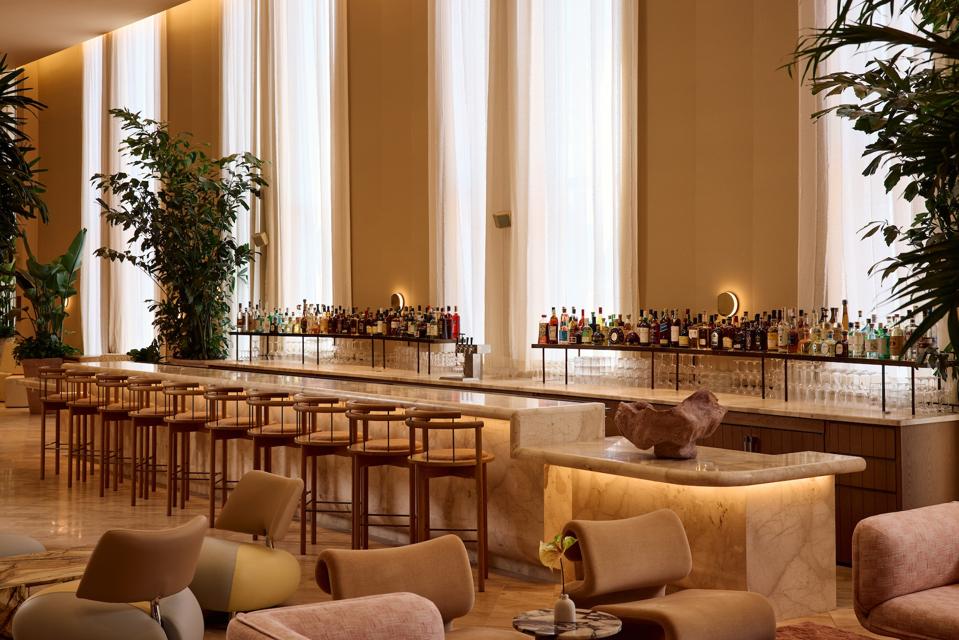The co-founder and president of Proper Hospitality takes a giant leap and transitions to seed oil free kitchens across its flagship brands.
“I’m obsessed with all things wellness and longevity,” says Brian de Loewe, co-founder and president of Proper Hospitality, a hip luxury hotel group with 13 design-forward properties offering state-of-the-art modern wellness from San Francisco to Austin to Miami, with three new destinations on the way.
Wellness at the Proper Hotels is built around five pillars: movement, recovery, nourishment, rest and connection, along with substantive cutting-edge technologies that support them. The Santa Monica Proper features a Recovery Suite with next-gen bio-optimization technology such as multi-wave-length pulsed electromagnetic fields, molecular hydrogen therapy, light and sound therapy, oxygen therapy. The Austin Proper offers hot/cold plunge, red light therapy, dry sauna. Each of the Proper hotels is equipped with a pool, spa and fitness center, and accoladed restaurants that serve organic produce, grass-fed meats, wild-caught seafood, and regenerative grains. “It’s all inspired by how I live at home,” he says.
Seed Oil Free Kitchens
De Loewe recently had what he calls “an AHA moment.” “We invested so much in wellness, but we were using seed oils in our fryers,” he says. De Loewe, who has himself been seed-oil free for years, gathered his chefs together. They agreed to make a shift and transition all of the kitchens across the flagship brands, Proper Hotels and By Proper, to become seed oil free, making The Proper the first seed oil free national hotel brand in the world. Proper, in partnership with Zero Acre Farms, switched to Zero Acre Oil, a rainwater-fed fermentation-derived sugarcane oil that offers a high smoke point and low environmental impact. According to Jeff Nobbs, co-founder & CEO, Zero Acre Farms, “Our production method uses 99 percent less water than olive oil and 87 percent less land than canola oil.” And, says De Loewe, it tastes great.
The Seed Oil Free Movement
The seed-oil free movement has been gaining a lot of publicity of late, with RFK, Jr. vociferously claiming that seed oils are harmful to human health. But there are plenty of people who eschewed seed oils well before MAHA, including de Loewe, who says that for him, “It’s not a political or marketing statement. It just felt right for our guests.”
Known by detractors as “the hateful eight,” the seed oils that have come under fire include canola oil (a.k.a. rapeseed oil), corn oil, grapeseed oil, soybean oil, sunflower oil, safflower oil, rice bran oil and peanut oil. These are commonly used in restaurant cooking, baking and deep frying because they have a high smoke point and they are cheap, which is why they are also ubiquitous in processed and ultra-processed foods.
Seeds themselves are high in vitamins, minerals and antioxidants, and they are a healthy source of fiber. But seed oils are put through a process where they are pressed, bleached, heated, processed with solvents and highly refined, which can strip them of their nutritional value. It is not the seeds that are inherently bad; the processing is what can be controversial.
Popular alternatives are extra virgin olive oil, avocado oil (which also has a high smoke point) and algae oil, the new kid on the block, which requires less water and land to cultivate than seed oils, and has a similar neutral flavor. Those looking to lessen their exposure to seed oils while dining out can order grilled, roasted, or steamed dishes, which are less likely to be cooked with those oils. Ask the server what types of oils are used in the dish you plan to order. Sometimes the chef can substitute a seed oil-free alternative. Look for a restaurant that touts itself as “seed-oil free.” Consult a third-party certifier or database, such as The Seed Free Alliance or Seed Oil Scout (which grew from 100,000 users to 1.5 million last year) as a reference.
A wellness innovator across the board, De Loewe created the first Proper Hotel in San Francisco in 2017 (designed by Kelly Wearstler), because he felt there was a hole in the marketplace. “Boutique hotels had good programming and cultural ties,” he says. “Luxury hotels had great service and amenities. But there weren’t hotels that had both.”
The Proper, he says, is for guests who can afford to stay at five-star hotels “but want a great vibe with a cultural connection.” The Proper Club, a wellness membership club recently launched in the Austin and Santa Monica hotels, was created to provide those local communities with access to the hotels’ wellness facilities, wellness classes, movement studios, recovery suites, live bands, speakers, cultural events, nutrition programs and more.
“Luxury travel is changing,” says De Loewe. “It’s no longer about access. It’s about how you feel when you walk out the door.” He says he is constantly asking himself, “How do we make it so that people who live a wellness lifestyle at home don’t have to downgrade at Proper?” Downgrade? Not a chance.

